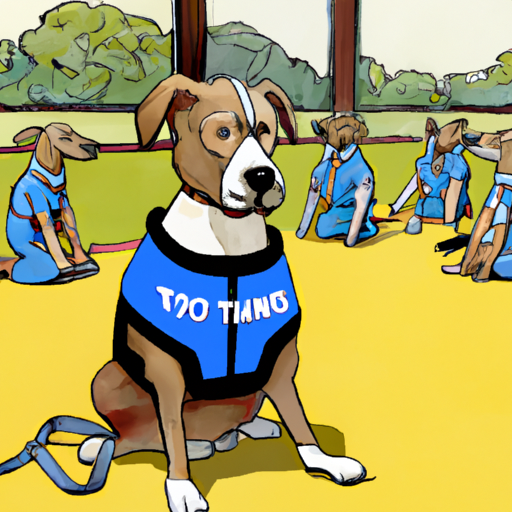Understanding Why Dogs Bark
Firstly, let’s delve into understanding the reasons why your furry friend might be barking at other dogs. Dogs bark for a variety of reasons such as:
- Fear
- Excitement
- Protective instinct
- Boredom
- Anxiety
It’s crucial to observe your dog’s behavior and understand the underlying cause of their barking. Once you’ve identified the triggers, you can tailor your training approach accordingly.
Implementing Desensitization Techniques
Desensitization is a psychological term that means reducing sensitivity. For dogs, it involves gradually exposing them to the trigger (in this case, other dogs) until they become less reactive.
- Start by exposing your dog to another dog from a distance where they notice the other dog but does not react.
- Reward them for calm behavior with treats or praise.
- Gradually decrease the distance between the dogs, rewarding calm behavior each time.
Remember, patience is key when implementing desensitization techniques.
Teaching the ‘Quiet’ Command
Training your dog to understand the ‘quiet’ command can be extremely beneficial. Here’s a simple method to do this:
- Allow your dog to start barking, then say “quiet” in a calm, firm voice.
- If the barking continues, calmly remove them from the situation.
- Once they stop barking, give them a treat or praise.
- Repeat these steps until your dog associates the command with the action.
Using Distraction Techniques
Another effective method is to distract your dog when they start barking at others.
- Ask your dog to perform a task they know well, such as “sit” or “stay”.
- Use toys, treats, or other forms of positive reinforcement to capture your dog’s attention.
Distraction is a quick fix but remember, it doesn’t address the root cause of the barking.
Seeking Professional Help
If your dog’s barking issue persists, it might be time to seek professional help. A professional dog trainer or a behaviorist can provide personalized training and advice. They can help identify issues that you might have missed and suggest effective training methods.
| Type | Benefits | Price Range |
|---|---|---|
| Professional Dog Trainer | Personalized training, faster results | $30-$100 per hour |
| Behaviorist | Addresses underlying behavioral issues | $100-$300 per hour |
Frequently Asked Questions
Q: How long does it take to train a dog not to bark at other dogs?
A: The length of training depends on the dog and the severity of the issue. It can range from a few weeks to several months.
Q: Is it bad to use a bark collar?
A: Bark collars can stop the barking, but they don’t address the root cause. It’s better to use training techniques that address the underlying issue.
Q: Will socializing my dog help with their barking?
A: Yes, socializing your dog can help them feel more comfortable around other dogs, which can reduce their need to bark.
Remember, every dog is unique and what works for one might not work for another. Be patient, consistent, and loving in your approach to training. Happy training!



